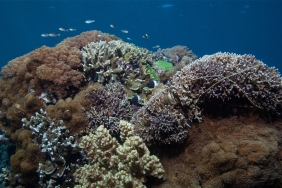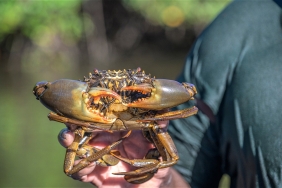2019, SOUTHEAST SULAWESI NEEDS A BETTER DATA MANAGEMENT FOR TUNA FISHERIES IMPROVEMENT
Author: Saraswati Adityarini (Capture Fisheries Officer, WWF-Indonesia)
Translator: NES
A note from tuna fisheries improvement program this year came from Kendari, Southeast Sulawesi. In 2018, Kendari has been successful in drawing up a work plan (20/01) for the improvement of tuna purse seine fisheries.
Richard Banks, Fisheries Management Assessor, explained the result of pre-assessment and fisheries improvement plan towards Marine Stewardship Council (MSC) certification, in front of fisheries stakeholders in Kendari (20/01).
From the pre-assessment’s result, priority targets in tuna fisheries improvement have been managed to identify. One of the targets is strengthening data and information regarding the composition of fishing fleet and species of the catch.
“Data collection system is crucial in paving the road leading to MSC ecolabel certification,” Banks said. “The source of data can be from the fishermen’s logbook, companies, fisheries observers, and data sampling. Technology will help in overcoming the availability of good data—which can be shared and integrated,” Banks continued.
Recording of fishermen’s catch data in a form of e-logbook is currently thriving. The fast-growing technology now allows fishermen to collect their catch data easily through smartphone’s application. Prior to this, fishermen were still performing manual recording, which required more time and energies to manage it.
“In addition to the necessity of digital transition, the necessity of observer’s assistance is also enormous. The observers, who assist the fishermen directly, have an important role in supporting the information regarding the ecosystem impact,” Banks explained, as he emphasized the significance of increasing the number of fisheries observers in fishing fleets, not only above 30 GT but also below 30 GT.
Action Plan from Kendari to Manage A Better Tuna Fisheries Practices
Southeast Sulawesi Province has expressed their support for the national tuna fisheries improvement program. One of companies that is carrying out the program is PT Pahala Bahari Nusantara (PT PBN), a tuna exporter company engaged in the business of processing yellow fin tuna (Thunnus albacares) and cakalang—local name for skipjack tuna (Katsuwonus pelamis) into processed products.
PT PBN is a member of Seafood Savers, an initiative of WWF-Indonesia that accommodates fisheries industry players to build sustainable fisheries through fisheries improvement program by obtaining Marine Stewardship Council (MSC) ecolabel certification.
PT PBN and other stakeholders have been drafting and disseminating the tuna purse seine fisheries improvement program work plan, which were embodied in a memorandum of understanding.
All stakeholders that were present at the meeting of ‘ Preparation of Tuna Purse Seine Fisheries Improvement Program (FIP) Work Plan in Kendari’ agreed to form a committee or collaboration team to assist the program to run well.
All stakeholders also concurred to carried out FIP according to the respective roles which were inscribed in FIP Work Plan.
“Now, we all know what are the things that need to be improved from our current fisheries practices to fulfill MSC certification’s standards,” Hary Christijanto, M.Sc, representative from Fisheries Inspector in Fishing Department, Directorate General of Capture Fisheries, Ministry of Marine Affairs and Fisheries Republic of Indonesia, said.
“In this improvement program, we must remember, in managing an area if one component goes missing, it will affect the other components. Fisheries improvement program is something that we shall assist together in order to improve our management condition and management capacity,” he ended, in front of all tuna fisheries stakeholders in Kendari, who have committed to sustainable tuna fisheries.





